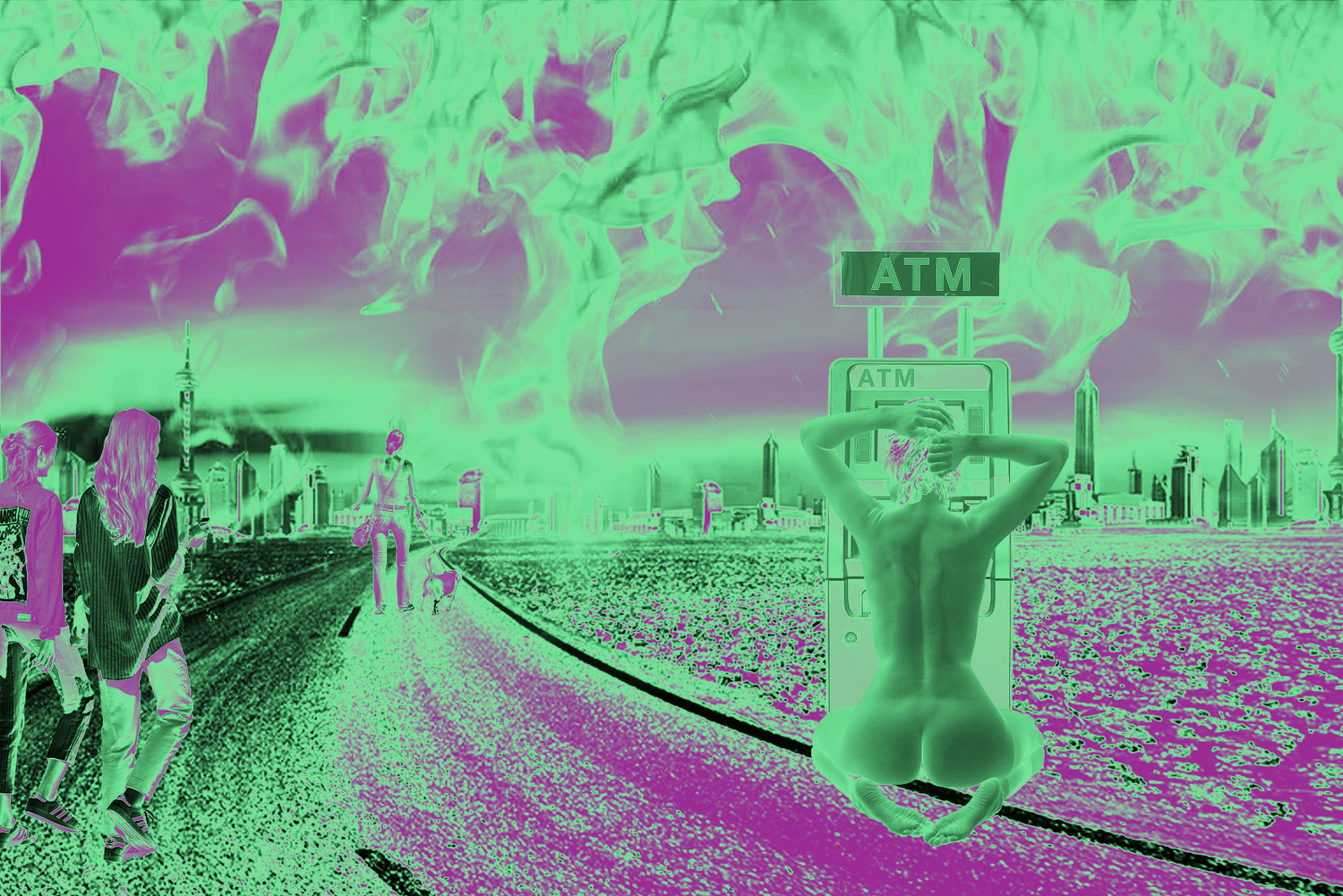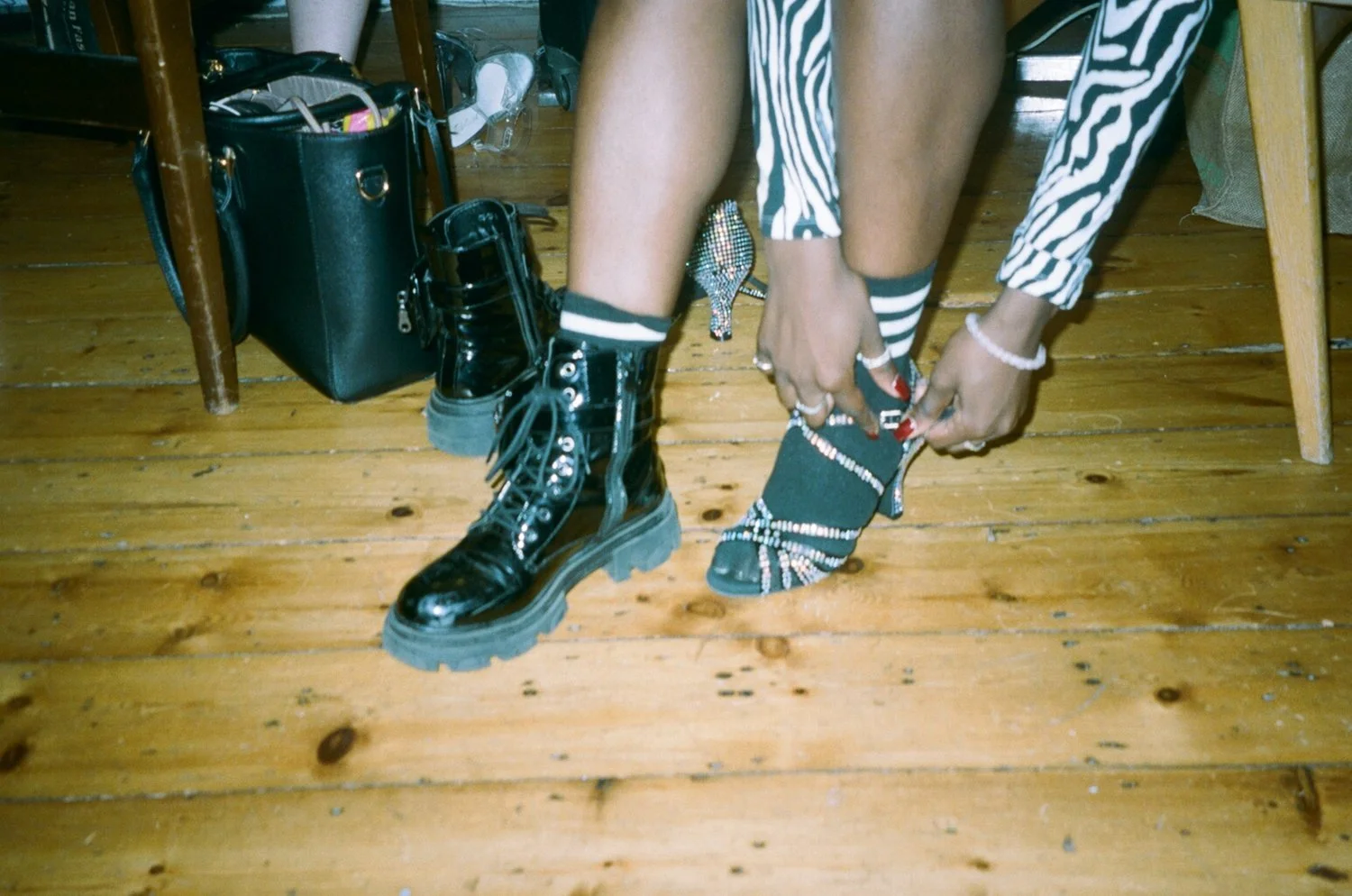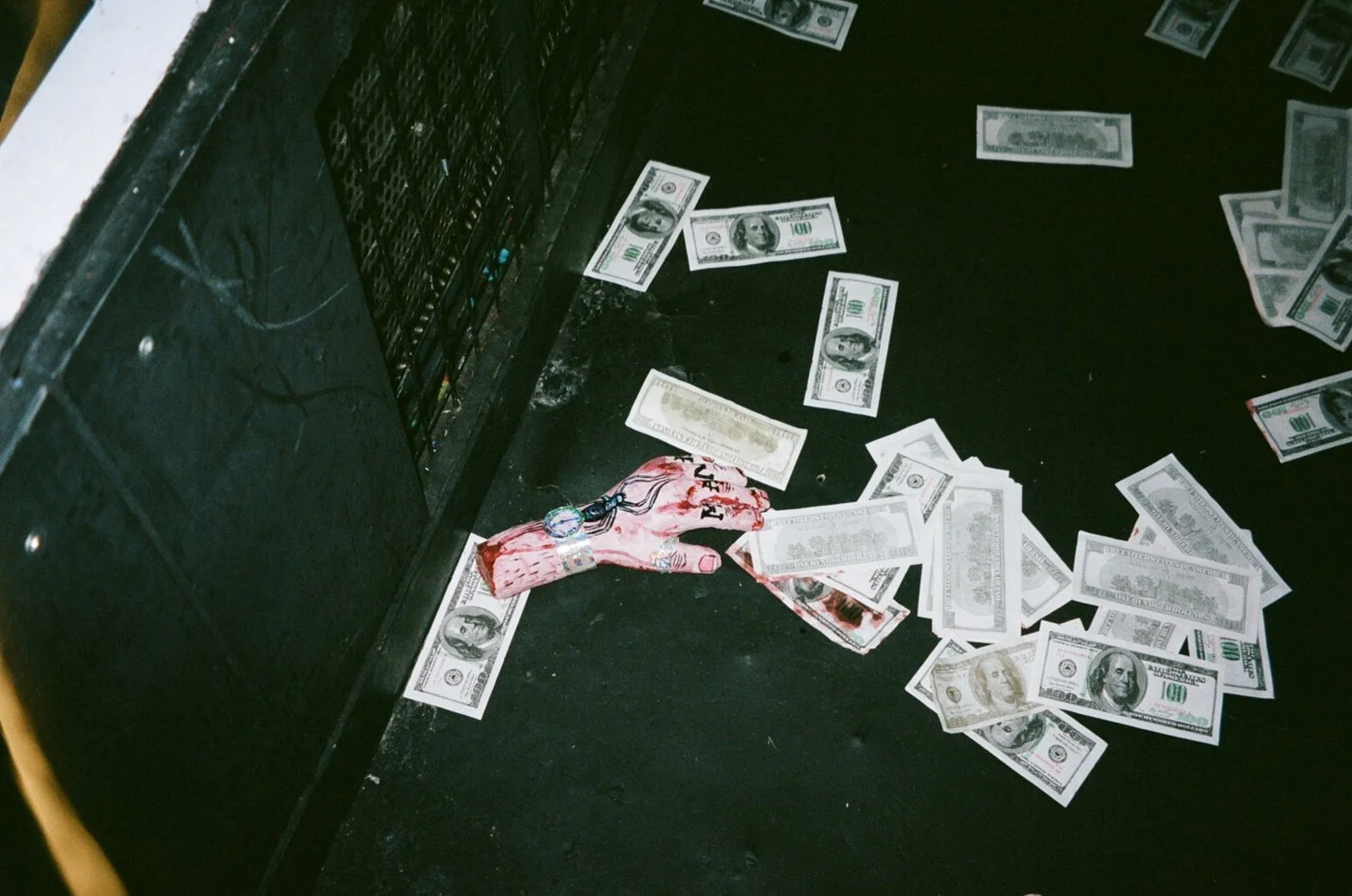Queer Whore Collective: Venus in Furlough
Make it stand out
When Covid-19 first took hold, people in recognised forms of employment began discussing the social distancing measures introduced in their workplaces; protective screens between desks…virtual meetings…work bubbles. Sex Workers tried their best to do the same.
"We could offer medical roleplays using masks and latex gloves?"
"What about financial domination where we just take the money and run?"
"Does anyone know how to give a hands-free tantric orgasm?"
"Should we just move over to Only Fans?"
Sadly, though, the majority of bookings you get as a full-service sex worker (someone who has physical sexual contact with their clients) take place within 2 metres of your punter and involve swapping saliva. In my personal experience, the whole Pretty Woman 'no kissing on the lips' rule is more of a 'don't walk on the grass' kind of bylaw - unrealistic and hard to maintain. And while it was resourceful (as well as a testament to this community's creative spirit) to think up specialised roleplays as workarounds, it meant taking a huge financial hit, since the most common request we tend to get, the 'girlfriend experience', just couldn't be safely replicated under these new circumstances. I mean, you try giving head with a mask on…
As the pandemic intensified, and society began to slowly acclimate to the dystopian nature of daily death tolls and dispatches from Downing Street, recognised workers were entered into furlough schemes, or given the infrastructure to work from home. Sex workers slipped through the cracks - we already exist in the shadows, visible to policy-makers only when they need to blow their load, and yes, we felt that blow…particularly street workers, migrant workers and all those who could not access any of the available public funds. Sex workers who were already making their living through camming or selling erotic content made life-saving guides on 'how to go digital' for struggling in-person workers such as newly unemployed strippers and escorts. Still, this sudden influx of online workers (including celebrities) meant that us inexperienced and/or under-platformed newbies were just picking up crumbs. I had previously been working from home anyway, which meant having clients visit my flat for incalls. Now my only option was Universal Credit, and I felt lucky I could claim that, even if it didn't cover the rent. Any workers who were ineligible for UC were simply left to gamble their health in order to pay their landlord's wages. Sex worker activism organisations, such as SWARM, set up vital hardship funds, which many, including myself, used to afford food. And, as it always, tirelessly, does, our community fought for each other harder than ever. The solidarity between sex workers is like nothing I've experienced before. We carried each other through a landscape of shame, stigma, censorship, danger, poverty and outright hatred. We shouted each other's pleas and needs over the deafening silence of the so-called feminists who always claim to want to save us from what we do. Where were they now with their contingency plans and exit strategies? Did this not expose how disingenuous their concern always was? Some of them even celebrated, making crude displays of delight on Twitter about our inability to work. Was this not evidence that their contempt for our means of earning a living is, and always was, rooted in disgust? How were we supposed to survive a respiratory illness when society already had us in a chokehold?
___STEADY_PAYWALL___
The Queer Whore Collective was founded in 2020 during this traumatic time for both sex workers and queer people, each disproportionately affected by the lack of recognition their identities and/or work status receive during the formulation of emergency policy and resources. We comprise 50 writers and artists who all identify under the umbrella of queer and work in the sex industry. We have strippers, cammers, content creators, full service sex workers, dominatrixes and sugar babies, to name a few. We are an international collective, with members from various different continents situated in countries where sex work ranges in its degree of legality, from fully to partly criminalised. As queer sex workers, we rely heavily on mutual aid, peer support and community mobilisation to keep each other safe. We help each other pool information regarding working conditions and safety, fundraise on behalf of one another and regularly share creative inspiration and opportunities. We collectively advocate for our queer sex worker family, and it is more important than ever to lift up the voices of those who are constantly overlooked by both pandemic protocols and pre-existing legislation. We are thrilled to be working with Polyester on a monthly column that examines the questions and dilemmas described above, as well as our personal experiences and opinions, giving an intersectional insight into the lives of sex workers - particularly what non-straight workers find themselves up against. Each coming article is written by a different member of our collective, and range from topics such as sex work and neurodivergence, consenting to sex work as an asexual lesbian, the exclusion of sex worker activism from wokeness, and more.
Image by: Katia Boegli
Our jobs involve turning a profit from the sexualisation of aspects of our identities, including our queerness. Many SWERFs (sex worker exclusionary radical feminists) believe that makes us double agents for the patriarchy, enabling sexism by selling its sexist tropes. But sexism happens anyway. There is so much stock to shift - why should everyone get to profit from it apart from us? However, when you are sexualised at the expense of being humanised, this makes you exponentially more unsafe - many people refer to this as fetishism. Fetishism happens the most to bipoc, fat, transgender or otherwise 'alternative', 'exotic' workers. A white, thin, cisgender, 'high class escort' has a monopoly on erotic capital - she is sexualised in so far as being the poster girl for white hetero-patriarchal beauty standards - as in, she benefits from enough other power structures that her overall value is maximised in the eyes of the male gaze. She is the one who could achieve a media frenzy if anything happened to her. She has the most credence with the police (though still significantly less than a non-sex worker). And clients know that. They remember that. Queer sex workers, perceived as a more unusual or eclectic subcategory, are often fetishised, and the extent to which that happens is based on their visibility levels and/or the intersection of other forms of identity-based oppression.
“I believe it's important to acknowledge that coercion exists within the sex industry, and to stand both against it and with anyone who is trying to exit.”
My ex girlfriend and I often heard from punters about our uniqueness as one of the only lesbian couples available 'for hire' where one of the girls is trans. I can remember the look on a client's face as he said, a slow smile appearing on his lips, "I've finally found my unicorns." It gave us the ick, but it also paid for dinner. The imbalance here is that for clients, visiting such 'other-wordly creatures' is more of a wild experience than a human encounter. It's a trip to the circus. We are a costume they can put on for an hour and then take off again. What happens in the sex dungeon does not go with them to the member's club. Yet a courtesan or a sugar baby traverses both these worlds. She is a fantasy who can be part of their reality. We are too niche to go undetected.
I don't experience racism or fatphobia in the industry on account of being white and slim, plus I come across middle class to my clients, which is a massive privilege. I do find, however, that I am considered much more the 'freak in the sheets' than I am the 'lady in the streets', because of my queerness, my mental and chronic illnesses and all those little, tell-tale giveaways of someone who grew up poor. Your boundaries get crossed and pushed when you are seen as less valuable and more vulnerable, more of a toy or an object or a target. Combine this with a pandemic-induced drought of bookings, plus lockdown-related closures of safe spaces to work such as hotels or serviced apartments, and suddenly clients know that we may be considering doing things or going to places we wouldn't usually, all in order to keep the lights on. I think this was the most surprising part for me, their opportunistic desire to beat down my prices or push for services I don't offer during a time when I was in need. It was one thing to get the predictable and totally useless platitudes from the 'nice guys', which cost me unpaid time to read and did nothing more than make them feel good:
"Hey, this must be a hard time for you, just checking in to see if you're okay? Sending love."
But it was another thing to get this, the first message I received during the first nationwide lockdown:
"Fuck off, Fun Pete."
It's not intrinsically bad to seek out or sell 'unprotected' services, but for him to use a pandemic as license to persuade people to tweak their terms and adjust their personal boundaries according to his own liking… that is unacceptable. I've succumbed to it before - moved the goalposts at someone's request, in the hopes for 'a little extra' at a time when I badly needed it. The trade-off was that suddenly I hadn't written the rulebook for something that was happening to my body. And participating in the sex trade under someone else's rules raises issues of consent. On a broader level, it's why we have a union, to protect our rights as workers against those who control the conditions of our labour, such as the owners of strip clubs or producers of pornography. And on an ideological level, we already work according to invisible, involuntary rules - unrealistic value systems, informed by patriarchy and white supremacy, that determine the amount of erotic capital at our disposal. That's why clients, trading their financial capital for an asset whose worth they themselves arbitrate, can abuse their power, and do so over some workers more easily than others - sex work is not a 'one size fits all' job title, in that the working conditions vary so radically. That's why it's important for us to have as much individual autonomy as possible when it comes to brokering these transactions.
There were also some clients that I had, strangely, considered friends (rookie error), or at least harboured an ill-placed impression that our years of successful and joyful exchanges within the sex industry had given rise to a mutually friendly sense of loyalty and understanding. I had half-expected their empathy and support rather than their parasitic urge to drive a bargain out of a newly exploitable human. I should have known better. As Kurt Vonnegut says, so it goes...
I don't know whether I'm more scandalised that his 'struggling business' was an excuse to haggle with a whore for three hours of her time at a rate she hadn't advertised and wasn't comfortable with, or that he quoted Alexander Pope by way of apology. When clients enter negotiations with "I know this is cheeky but…" it rings alarm bells for me; I start to worry about the precedent this sets and the boundaries they might push later down the line, in a job where I do not have adequate rights and protection when things go wrong.
Plus, it's creepy to spam people with messages when they don't reply. Spamming a hooker is just the same as spamming your hairdresser, or your doctor. It undermines their professional authority. Pushing inappropriately for a response or for an unavailable service or for a discount moves you from using a service into extorting it, and extorting sex is rape. There's already a thin line between consent and coercion under the inherently exploitative landscape of capitalism, and that quick cash pay-out you get from accepting a booking, under whatever terms, can be very seductive, especially if you're struggling with addiction or debt. I believe it's important to acknowledge that coercion exists within the sex industry, and to stand both against it and with anyone who is trying to exit. I do also believe that patriarchy and poverty are the main culprits behind coercive participation, rather than the act of selling sex itself. These systemic societal imbalances infiltrate every job there is. Criminalising the sex industry in particular just strips us of a means of survival, making us more desperate, and pushes our work underground, putting us at greater risk of violence. We just want to be seen, to be listened to and to be safe.
Words: Bella Violet Quinn | Photography: Studio Medusa








